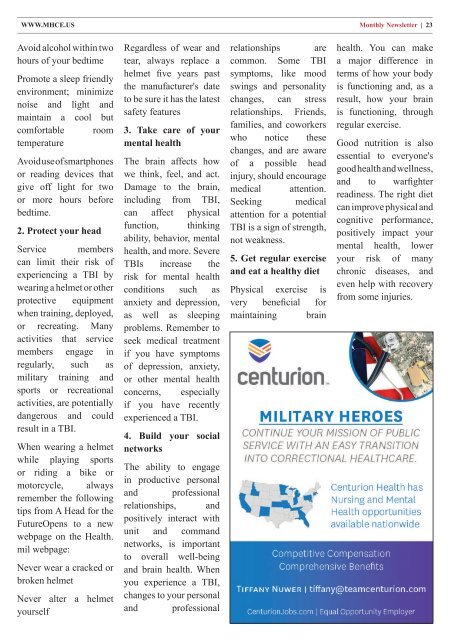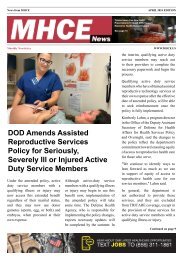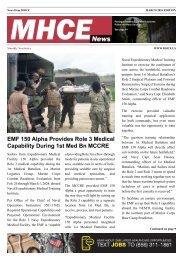You also want an ePaper? Increase the reach of your titles
YUMPU automatically turns print PDFs into web optimized ePapers that Google loves.
WWW.<strong>MHCE</strong>.US Monthly <strong>Newsletter</strong> | 23<br />
Avoid alcohol within two<br />
hours of your bedtime<br />
Promote a sleep friendly<br />
environment; minimize<br />
noise and light and<br />
maintain a cool but<br />
comfortable room<br />
temperature<br />
Avoid use of smartphones<br />
or reading devices that<br />
give off light for two<br />
or more hours before<br />
bedtime.<br />
2. Protect your head<br />
Service members<br />
can limit their risk of<br />
experiencing a TBI by<br />
wearing a helmet or other<br />
protective equipment<br />
when training, deployed,<br />
or recreating. Many<br />
activities that service<br />
members engage in<br />
regularly, such as<br />
military training and<br />
sports or recreational<br />
activities, are potentially<br />
dangerous and could<br />
result in a TBI.<br />
When wearing a helmet<br />
while playing sports<br />
or riding a bike or<br />
motorcycle, always<br />
remember the following<br />
tips from A Head for the<br />
FutureOpens to a new<br />
webpage on the Health.<br />
mil webpage:<br />
Never wear a cracked or<br />
broken helmet<br />
Never alter a helmet<br />
yourself<br />
Regardless of wear and<br />
tear, always replace a<br />
helmet five years past<br />
the manufacturer's date<br />
to be sure it has the latest<br />
safety features<br />
3. Take care of your<br />
mental health<br />
The brain affects how<br />
we think, feel, and act.<br />
Damage to the brain,<br />
including from TBI,<br />
can affect physical<br />
function, thinking<br />
ability, behavior, mental<br />
health, and more. Severe<br />
TBIs increase the<br />
risk for mental health<br />
conditions such as<br />
anxiety and depression,<br />
as well as sleeping<br />
problems. Remember to<br />
seek medical treatment<br />
if you have symptoms<br />
of depression, anxiety,<br />
or other mental health<br />
concerns, especially<br />
if you have recently<br />
experienced a TBI.<br />
4. Build your social<br />
networks<br />
The ability to engage<br />
in productive personal<br />
and professional<br />
relationships, and<br />
positively interact with<br />
unit and command<br />
networks, is important<br />
to overall well-being<br />
and brain health. When<br />
you experience a TBI,<br />
changes to your personal<br />
and professional<br />
relationships are<br />
common. Some TBI<br />
symptoms, like mood<br />
swings and personality<br />
changes, can stress<br />
relationships. Friends,<br />
families, and coworkers<br />
who notice these<br />
changes, and are aware<br />
of a possible head<br />
injury, should encourage<br />
medical attention.<br />
Seeking medical<br />
attention for a potential<br />
TBI is a sign of strength,<br />
not weakness.<br />
5. Get regular exercise<br />
and eat a healthy diet<br />
Physical exercise is<br />
very beneficial for<br />
maintaining brain<br />
health. You can make<br />
a major difference in<br />
terms of how your body<br />
is functioning and, as a<br />
result, how your brain<br />
is functioning, through<br />
regular exercise.<br />
Good nutrition is also<br />
essential to everyone's<br />
good health and wellness,<br />
and to warfighter<br />
readiness. The right diet<br />
can improve physical and<br />
cognitive performance,<br />
positively impact your<br />
mental health, lower<br />
your risk of many<br />
chronic diseases, and<br />
even help with recovery<br />
from some injuries.


















